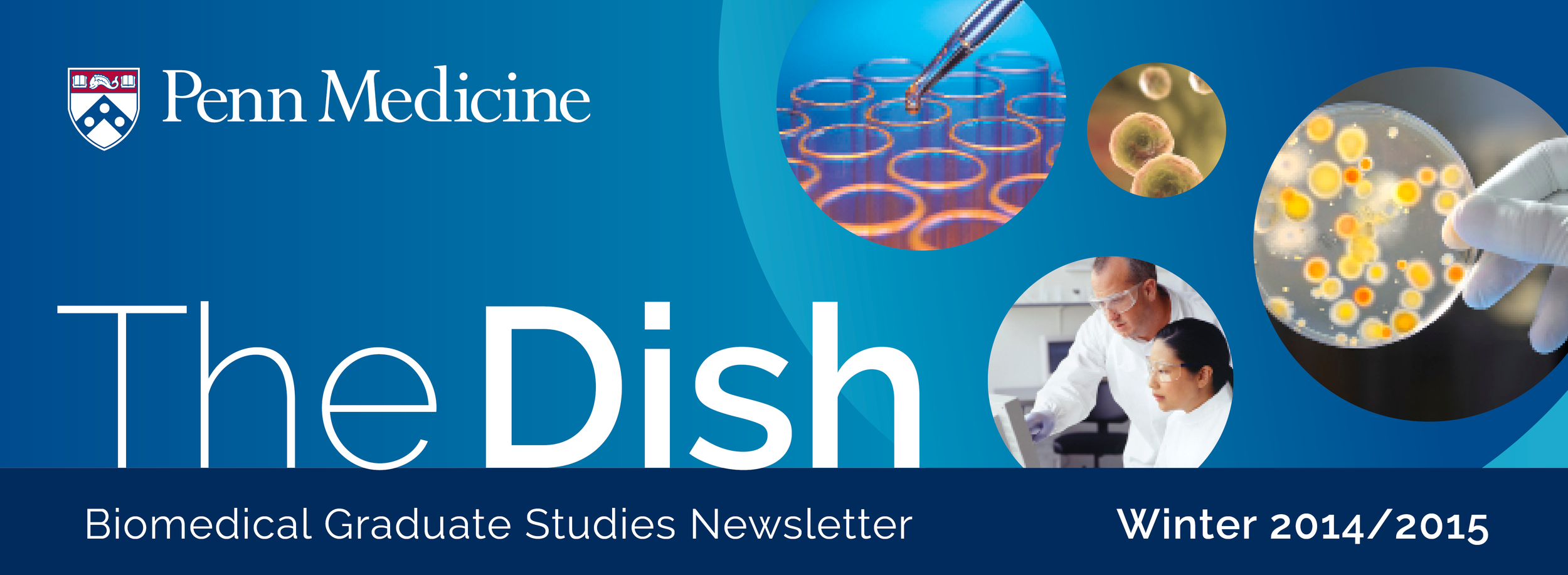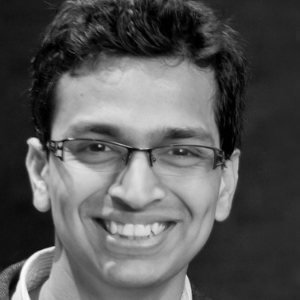A Letter from Michael P. Nusbaum, PhD
Michael P. Nusbaum, PhD
Professor, Department of Neuroscience
Director, Biomedical Graduate Studies
Hi, All:
For many people, the end of the year provides an opportunity for reflection, celebration, and giving. I’m writing to you today in this context to highlight the changing landscape for financing graduate student training, and to emphasize that collective support from individuals like yourself for Penn Biomedical Graduate Studies is no longer an add-on luxury but has become a key component for ensuring continued success.
Historically, a significant component of support for Penn BGS education/training comes from federal research grants. Due to federal budget limitations, grant support from the NIH and NSF has diminished considerably. The increasing challenge of obtaining federal grant support is having an impact on the careers of our students, starting right at the beginning by limiting their opportunities for thesis lab selection. With increasing frequency, students are unable to settle into their first (and sometimes, second or third) choice thesis lab. These unavailable labs continue to do leading-edge research, but many have necessarily down-sized due to funding limitations. I think that it would be a tragedy for the careers of our students, and for the biomedical research enterprise, if this trend were to continue unchecked.
I therefore ask that you partner with us to maintain the preeminence of the Penn BGS Program. With your gifts (small or large) to the Penn BGS Fellowship Fund, we can ensure that each student settles in the right lab and has the best opportunity to succeed.
Thank you so very much for being part of the BGS family and representing Penn so well in all that you do. I’d also like to remind you about our 30th Anniversary Event and 1st Alumni Weekend, to which you are all invited, on October 8 – 10, 2015. I will have more details for you in an upcoming issue of The Dish.
If you want to touch base with me about anything BGS-related, feel free to email me (nusbaum@upenn.edu).
I hope your past year has been a successful and productive one (ditto for next year!), and that we’ll see you at our 30th Anniversary celebration next October 8 – 10, 2015.
Have a great holiday season.
Mikey
Michael P. Nusbaum, PhD
Professor, Department of Neuroscience
Director, Biomedical Graduate Studies
After BGS, the Rest is Derivative(s)
Adam Koppel, M'95, GR'97, WG'00
PhD in Neuroscience Powers Adam Koppel’s Ride to Wall Street and Back to the Bedside at Biogen
“Being a biomedical PhD student is a challenging time. Know that your Penn degree makes you one of a small number of knowledge creators, and on the other side, we [science and business organizations] are looking for your ideas.”
These encouraging words come from Adam Koppel, who followed Penn graduate degrees (MD, PhD in Neuroscience and Wharton MBA) with more than a decade investing in public markets at Brookside Capital, an affiliate of Bain Capital, and now a new role as Chief Strategy Officer at Biogen Idec.
“Getting my PhD is my proudest accomplishment. It’s the only time I’ve confronted the challenge of creating new knowledge.”
Adam was attracted to BGS by the work in molecular biology, neuroscience, and systems biology led by John Trojanowski and Virginia Lee, Alan Rosenquist, Larry Palmer, and Steve Galetta.
Neuroscience faculty member Jon Raper was Adam’s PhD mentor. “Jon is probably the single educator who impacted my life more than any other. He taught me what good science is: the rigorous logic you must use to develop an experimental approach and conduct a good experiment. He pushed us to be able to envision the paper before we did the experiment. I’ve never forgotten his clear-eyed approach ── and I still try to use it to this day.”
“When I was in Jon’s lab, we had a high-energy, but also a very tight-knit group. It seemed like every week one of us had interesting data coming out to discuss and argue about.”
Adam points to three enduring impacts of his grad school days. “First, I learned my approach to big questions. You form a hypothesis, and use primary data from interviews or mathematical analysis, to support or refute that conjecture.”
“Second, be a crisp decision maker. Jon was a model here. You need this for investment.”
“Third, credibility. I can work with top notch scientists because I studied at Penn with Jon. Whether the topic is Hepatitis C, HIV, diabetes, or basic science, I can have deep conversations about their work.”
In his leadership role at Biogen Idec, Adam has a clear line of sight and fiduciary responsibility not just to board members and shareholders, but to patients as well. Adam enjoys fostering partnerships between researchers and business people to address the unmet needs of patients.
Looking ahead, Adam argues for collaboration. “The problems are too big,” he said. “No one company or university is going to solve Alzheimer’s disease or heart disease. Fundamental therapeutics must be collaborative. I am convinced that consortiums across for-profit and academic labs are where meaningful progress will be made.”
Catching Up With Recent BGS Grad, Vignesh Kasinath, GR’14
Vignesh Kasinath, GR'14
Vignesh Kasinath, GR’14, gave us a glimpse into his Penn experience, and an update on his life after BGS.
Q: Is there a particular moment that made you want to become a scientist?
A: I always had a natural inclination. Growing up in India, my parents gave me many books that influenced my love of science. One that I remember fondly is the Feynman Lecture Series. My dad was a chemist, and much of my chemistry knowledge came from his books. My mom worked at a bank. Though not particularly science-oriented, she helped provide a balance between my various interests. I had an interest in Physics, and in high school I enjoyed studying Biology.
Q: How did you end up at Penn BGS?
A: During my undergraduate study at the Indian Institute of Technology, I participated in an exchange program at Purdue University and became interested in protein-folding problems. I was particularly interested in Dr. Walter Englander’s and Dr. Bill DeGrado’s work at Penn, and I had a great phone interview with Dr. Josh Wand. Once at Penn, I had an enriching and very productive rotation in Josh’s lab. So I joined the Wand Lab for my doctoral thesis.
Q: Being an international student, were there any additional hurdles in applying to Penn?
A: Before applying, I emailed the program coordinator, who indicated that few international students are accepted, but still encouraged me to apply. Since undergraduate work in India is largely theoretical, such as simulations and modeling, applicants like me must prove that they have experience doing experimental work. My background was primarily computational, but my internship and exchange study at Purdue provided some valuable learning experience, particularly in biochemistry.
Q: What made the Penn BGS program special for you?
A: I would say what makes BGS great is that so many people are doing science in different departments ─ biophysics, neuroscience, and pharmacology ─ yet everyone is under the same program. From day one you have the option to work with anyone in BGS, even if they're not part of the medical school. Not many universities have that kind of flexibility. Penn is extraordinarily vast and deep.
Q: Describe your experience training under Josh Wand.
A: Josh is a unique investigator. He has a talent for determining which students prefer more hands-on instruction, and which prefer more autonomy, and then he adjusts his teaching style accordingly. Though I prefer working slightly independently, if I couldn’t figure something out on my own, Josh was always there. Even when traveling, his email replies are almost instantaneous. He lets everyone in the lab join in on whatever project interests them. I worked on so many different projects, and learned how to be a scientist in his lab.
Q: You’re currently doing a post-doc at Berkeley. What are you working on?
A: I did NMR spectroscopy for my PhD, but now I'll be doing electron microscopy, a slightly different technique. Within the community, few do both NMR and EM, so this will create a niche for me to address problems that others might not be able to approach.
Upcoming Events
Cell & Molecular Biology Graduate Group:
Seminar featuring Jennifer Pluznick, PhD
Friday, April 17, 2015, 12:30 – 1:30 PM
Reunion Hall, John Morgan Building, Penn Campus
Jennifer Pluznick is Assistant Professor of Physiology at Johns Hopkins Medicine.
For more info, contact Meagan Schofer.
Epidemiology & Biostatistics Graduate Group:
Biostatistics Seminar Series
Tuesday, January 20, 2015, 3:30 - 4:30 PM
Speaker: Michael Proschan, PhD
Room 701, Blockley Hall, Penn Campus
Michael Proschan is a mathematical statistician with the National Institute of Allergy and Infectious Diseases
For more info, contact Yimei Li.
Immunology Graduate Group:
Immunology Colloquium: Christopher Glass, MD, PhD
Tuesday, February 3, 2015, 4:00 - 5:00 PM
Austrian Auditorium, Clinical Research Building, Penn Campus
Christopher Glass is Professor of Medicine and Cellular & Molecular Medicine at the University of California, San Diego.
Immunology Colloquium: Jason Cyster, PhD
Tuesday, March 3, 2015, 4:00 - 5:00 PM
Austrian Auditorium, Clinical Research Building, Penn Campus
Jason Cyster is Professor of Microbiology and Immunology at the University of California, San Francisco.
Immunology Colloquium: Kenneth Murphy, MD, PhD
Tuesday, April 21, 2015, 4:00 - 5:00 PM
Austrian Auditorium, Clinical Research Building, Penn Campus
Kenneth Murphy is Professor of Pathology at Washington University in St. Louis School of Medicine and an Investigator at the Howard Hughes Medical Institute.
For more info, please contact Mary Taylor.
Neuroscience Graduate Group:
Mahoney Institute for Neurosciences 31st Annual Retreat
Wednesday, April 1, 2015, All-day event
Houston Hall, Penn Campus
For more info, contact Jacqueline Fowlkes.
Pharmacology Graduate Group:
The 20th Annual Dolan B. Pritchett Memorial Lecture
Speaker: Jeffrey I. Gordon, MD
Monday, March 23, 2015, 4:00 PM
Rubenstein Auditorium, Smilow Center, Penn Campus
Jeffrey Gordon is Professor of Pathology & Immunology at Washington University in St. Louis School.
The 38th Annual Carl F. Schmidt Honorary Lecture
Speaker: Joseph M. DeSimone, PhD
Monday, April 27, 2015, 4:00 PM
Rubenstein Auditorium, Smilow Center, Penn Campus
Joseph DeSimone is Chancellor's Eminent Professor of Chemistry at UNC-Chapel Hill.
For more info, visit http://www.med.upenn.edu/pharm/seminar_series.shtml
If you would like to learn more about Penn Biomedical Graduate Studies, contact Torren Blair at torrenb@upenn.edu.








